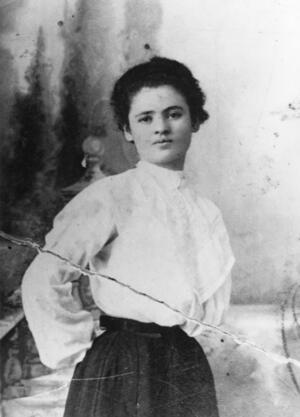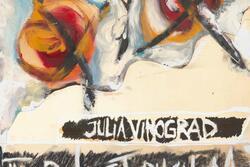Writing a Revolutionary
Authors are often asked about the inspiration behind their books. Usually, that question is a tricky one to answer. But in the case of my historical novel for young adults, Audacity, it’s easy. The life of labor activist Clara Lemlich was all the inspiration I needed.
I began work on this story several years ago, during graduate school. My professor at the time encouraged me to challenge myself by attempting a genre new to me—historical fiction. I knew right away, in looking to history, what I wanted my subject to be: those bold women who spoke up, marched, braved picket lines and even prison to secure the rights we enjoy today. But I had no idea that my research would lead me to someone as extraordinary as Clara Lemlich.
Since this would be a book for young adults, I was searching in particular for a historical figure close to my readers’ age. I wanted to find someone whose life story would be an inspiration to them—who would make young people believe they could change our world for the better.
So I began scouring biographies and academic texts. I researched upper class activists in the early 1900s who brought their college educations and their influence in society to bear on the fight for women’s suffrage. I learned about working-class activists, many of whom were Jewish immigrants whose families had fled religious persecution in the Russian Empire. In this new world, immigrants lived in bitter poverty, working long days in dirty sweatshops. They had only just arrived in this country, and already they were spending what little free time they had protesting child labor, unsustainable wages, and what are now criminal working conditions. I was astonished by their strength, and humbled by their sacrifice.
And Clara stood above them all.
In order to write a character, I have to understand the person, which is a difficult thing to do when your subject is a historical figure. No amount of research is going to tell me what Clara thought and how she felt in a given moment. All I could do was research extensively, and learn to read between the lines of all I had gathered.
I began with my local library where I poured over countless rolls of microfilm. I searched immigration records at the National Archive. I listened to audio recordings of her voice and spoke with her descendants. I traveled to a library at NYU that holds artifacts of Clara’s—letters, old photographs, her union membership card, her journals. I visited the tenement museum and toured a restored apartment just like the one she would have lived in. I walked the Lower East Side so I could see the library where she studied, the neighborhood where she lived, the stage where she spoke at Cooper Union, and the courthouse where she was jailed.
When people talk about Clara, they tend to use the same adjectives: brave, determined, passionate. It’s easy to be inspired by her story. And yet, she occupies little more than a few lines in high school history textbooks. I wanted to bring her out of the black and white of history and out of those textbooks. I wanted her to come alive for young readers.
When I sit down to write a new story, I try to pinpoint how the arc of the story will curve to its inevitable end. I decided that Audacity’s arc needed to begin with Clara’s early years. In order for her bravery to mean something, in order for her selflessness to resonate, readers had to understand all that she came from, and all that had shaped her into such an extraordinary individual.
Opening this story in the Russian Empire during Clara’s teen years, however, meant I would have six years to cover in the novel. Some books take place on a single day, or within the span of a week. Six years is a lot. But each one of those years held some part of the whole that I couldn’t leave out. Clara’s determination is something she grew into, something that solidified inside her until there was no other way forward. I couldn’t leave all that becoming out of her story.
Not only did the elevated language and image-rich lines of free verse allow me to capture Clara’s passions and aspirations, her triumphs and crushing defeats on the page, but it gave me the freedom to speed up and slow down the timeline as the story demanded. I treated each poem like a snapshot of a scene, staged with historical minutia, shaded in sensory detail, and tinted by the workings of Clara’s mind and heart. Put together, all those little snapshots create a narrative that skips and slows and skips again through time—a little like flipping through pages in a photo album.
I didn’t know when I wrote Audacity that a few years later the streets of New York, and indeed, the whole country, would be filled once again with young people marching for religious freedom, immigrants’ rights, and women’s rights.
Not everyone is brave enough to lift the megaphone to her lips or to step to the front of the picket line. But we all have a role to play in creating a more just society. My hope for Audacity is that young readers will be empowered by Clara’s story, and inspired to seek their own way of bringing about positive change in their communities.
After all, young people are often the ones to hold up a needed mirror to society, to energize movements for change, and to draw out compassion from the opposition. If we are called again to action, how wonderful that we have the shining example of Clara—her bravery, her moral fortitude, and her determination—to light the way.
Melanie Crowder's Audacity is JWA's Young Adult Book Club pick of 2017. For more great books, and to learn about JWA's Book Club, visit our bookshelf.






